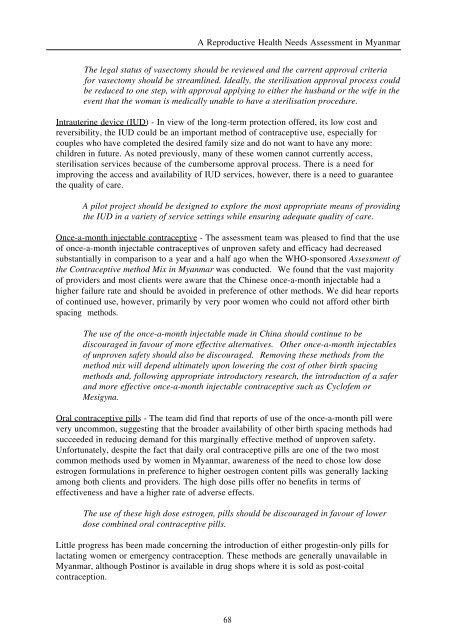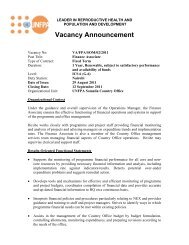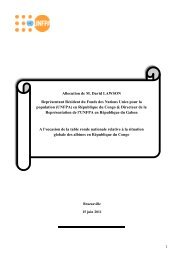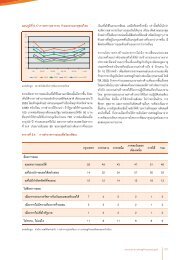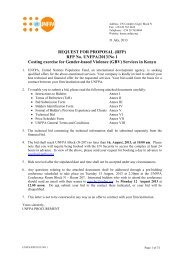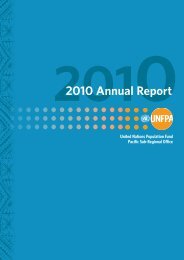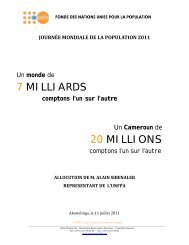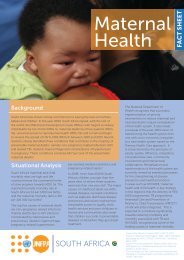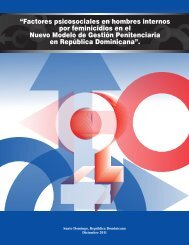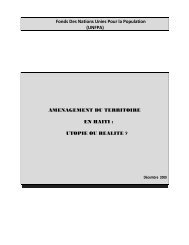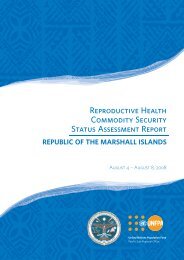A reproductive health needs assessment in Myanmar
A reproductive health needs assessment in Myanmar
A reproductive health needs assessment in Myanmar
You also want an ePaper? Increase the reach of your titles
YUMPU automatically turns print PDFs into web optimized ePapers that Google loves.
A Reproductive Health Needs Assessment <strong>in</strong> <strong>Myanmar</strong><br />
The legal status of vasectomy should be reviewed and the current approval criteria<br />
for vasectomy should be streaml<strong>in</strong>ed. Ideally, the sterilisation approval process could<br />
be reduced to one step, with approval apply<strong>in</strong>g to either the husband or the wife <strong>in</strong> the<br />
event that the woman is medically unable to have a sterilisation procedure.<br />
Intrauter<strong>in</strong>e device (IUD) - In view of the long-term protection offered, its low cost and<br />
reversibility, the IUD could be an important method of contraceptive use, especially for<br />
couples who have completed the desired family size and do not want to have any more:<br />
children <strong>in</strong> future. As noted previously, many of these women cannot currently access,<br />
sterilisation services because of the cumbersome approval process. There is a need for<br />
improv<strong>in</strong>g the access and availability of IUD services, however, there is a need to guarantee<br />
the quality of care.<br />
A pilot project should be designed to explore the most appropriate means of provid<strong>in</strong>g<br />
the IUD <strong>in</strong> a variety of service sett<strong>in</strong>gs while ensur<strong>in</strong>g adequate quality of care.<br />
Once-a-month <strong>in</strong>jectable contraceptive - The <strong>assessment</strong> team was pleased to f<strong>in</strong>d that the use<br />
of once-a-month <strong>in</strong>jectable contraceptives of unproven safety and efficacy had decreased<br />
substantially <strong>in</strong> comparison to a year and a half ago when the WHO-sponsored Assessment of<br />
the Contraceptive method Mix <strong>in</strong> <strong>Myanmar</strong> was conducted. We found that the vast majority<br />
of providers and most clients were aware that the Ch<strong>in</strong>ese once-a-month <strong>in</strong>jectable had a<br />
higher failure rate and should be avoided <strong>in</strong> preference of other methods. We did hear reports<br />
of cont<strong>in</strong>ued use, however, primarily by very poor women who could not afford other birth<br />
spac<strong>in</strong>g methods.<br />
The use of the once-a-month <strong>in</strong>jectable made <strong>in</strong> Ch<strong>in</strong>a should cont<strong>in</strong>ue to be<br />
discouraged <strong>in</strong> favour of more effective alternatives. Other once-a-month <strong>in</strong>jectables<br />
of unproven safety should also be discouraged. Remov<strong>in</strong>g these methods from the<br />
method mix will depend ultimately upon lower<strong>in</strong>g the cost of other birth spac<strong>in</strong>g<br />
methods and, follow<strong>in</strong>g appropriate <strong>in</strong>troductory research, the <strong>in</strong>troduction of a safer<br />
and more effective once-a-month <strong>in</strong>jectable contraceptive such as Cyclofem or<br />
Mesigyna.<br />
Oral contraceptive pills - The team did f<strong>in</strong>d that reports of use of the once-a-month pill were<br />
very uncommon, suggest<strong>in</strong>g that the broader availability of other birth spac<strong>in</strong>g methods had<br />
succeeded <strong>in</strong> reduc<strong>in</strong>g demand for this marg<strong>in</strong>ally effective method of unproven safety.<br />
Unfortunately, despite the fact that daily oral contraceptive pills are one of the two most<br />
common methods used by women <strong>in</strong> <strong>Myanmar</strong>, awareness of the need to chose low dose<br />
estrogen formulations <strong>in</strong> preference to higher oestrogen content pills was generally lack<strong>in</strong>g<br />
among both clients and providers. The high dose pills offer no benefits <strong>in</strong> terms of<br />
effectiveness and have a higher rate of adverse effects.<br />
The use of these high dose estrogen, pills should be discouraged <strong>in</strong> favour of lower<br />
dose comb<strong>in</strong>ed oral contraceptive pills.<br />
Little progress has been made concern<strong>in</strong>g the <strong>in</strong>troduction of either progest<strong>in</strong>-only pills for<br />
lactat<strong>in</strong>g women or emergency contraception. These methods are generally unavailable <strong>in</strong><br />
<strong>Myanmar</strong>, although Post<strong>in</strong>or is available <strong>in</strong> drug shops where it is sold as post-coital<br />
contraception.<br />
68


